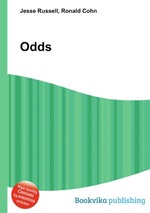High Quality Content by WIKIPEDIA articles! The odds in favor of an event or a proposition are expressed as the ratio of a pair of integers, which is the ratio of the probability that an event will happen to the probability that it will not happen. For example, the odds that a randomly chosen day of the week is a Sunday are one to six, which is sometimes written 1:6, or 1/6. In probability theory and statistics, where the variable p is the probability in favor of the event, and the probability against the event is therefore 1-p, "the odds" of the event are the quotient of the two, or . That value may be regarded as the relative likelihood the event will happen, expressed as a fraction (if it is less than 1), or a multiple (if it is equal to or greater than one) of the likelihood that the event will not happen. In the example just given, saying the odds of a Sunday are "one to six" or, less commonly, "one-sixth" means the probability of picking a Sunday randomly is one-sixth the probability of not picking a Sunday. While the mathematical probability of an event has a value in the range from zero to one, "the odds" in favor of that same event lie between zero and infinity. The odds against the event with probability given as p are .


